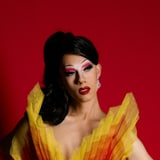Michel von Känel is a teacher and does drag once a month. He is twice in the line of fire, as he says in an interview. But he doesn’t let that get him down.
SRF: What does drag mean to you?
Michel von Känel: The freedom to appear as I want. To be free and to celebrate femininity. Because in our society, femininity is still portrayed as something weak. Especially in men. As a drag, I take my femininity and turn it into a strength.
But drag is also a political statement?
Drag queens have always been figureheads of the Pride movement. In the current debate, we are being exploited by the other side precisely because we are so political. Drag is made into an enemy. We are portrayed as evil because we play with gender. This makes us exactly what many right-wing positions do not want to see. So I want to be clear: drag is an art form. We are not villains, but peace-loving people.
You are a teacher and must follow the curriculum also about gender roles teach. How do you do that?
It’s important that we talk about this in school because queer and trans youth are much more likely to face bullying, which increases suicide rates. Education is needed to keep bullying in check and bring objectivity into the discussion. First of all, however, we need the terms so that we can even talk about them.
I would like to deal with these topics in more depth, but as a queer teacher I am in the line of fire here and I find it difficult to approach these topics in the way I would like, also out of self-protection. However, the ability to respectfully discuss gender issues with one another is part of the curriculum.
Have parents already signed up?
Never because of the lessons, but because of my work as a drag queen. I am not a teacher who wants to influence the children politically. Many are afraid that if a teacher like me comes, the children will all become gay and lesbian. I can reassure them that I can’t even get the kids to do their homework.
Does the school management support you?
Yes, and that was also very important to me when I chose the school. That’s why I made it clear in my application that I’m a drag queen.
Have you experienced a lot of attacks or discrimination?
Luckily I have never experienced physical attacks, but I have experienced many hurtful words – on social media and on the street, there is violence. I always say: “It bounces off me and I’m over it.” But sometimes I sit at home and think: “Wow, it’s crazy that I can’t just walk down the street like everyone else.”
You have to expect violent reactions, why did you still appear in the SRF Club?
I had a hard time getting on the show. I heard about the death threats at the secondary school in Stäfa as part of gender day. And because I am doubly affected by the topic as a teacher and as a drag queen, I was afraid for my safety.
Fear doesn’t get me anywhere.
But then I thought, “No, I won’t let these voices silence me.” I came out when I was 21. I’m here and it’s important that I can take a stand. Nobody can take that from me. Fear doesn’t get me anywhere. That’s what it’s about for me as a drag queen, but also as a teacher.
The conversation was led by Barbara Lüthi.
